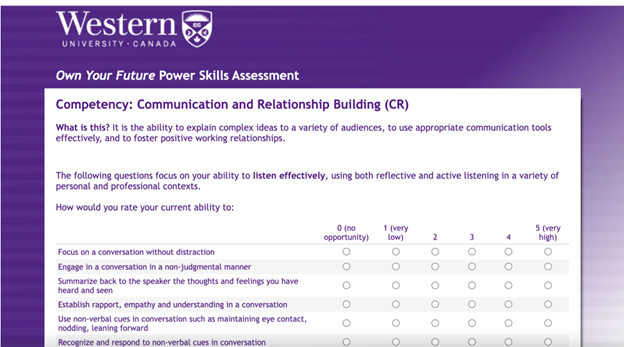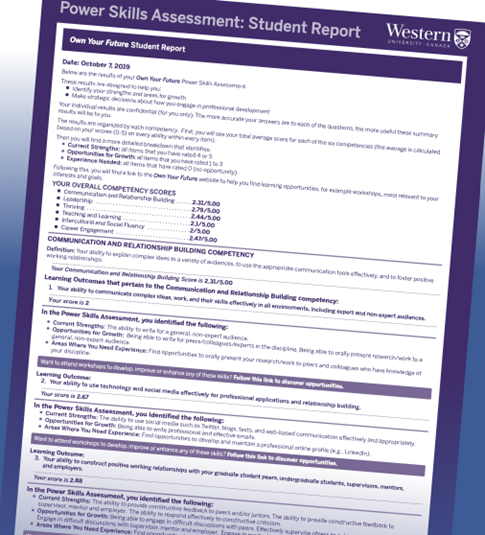Many doctoral students end up in careers outside tenure-stream academia. Consequently, universities are placing more and more emphasis on broad skills development for their PhD students to equip them for a variety of careers. But it can be challenging and resource-intensive to construct doctoral-level programming that is both effective and works across all disciplines.
Western University’s Own Your Future program seeks to help change that with a doctoral professional development program that is in-depth, comprehensive and can be replicated and shared beyond the institution.
How does it work?
The program has two main components: skills identification and skills building.
With the former, students complete the program’s Power Skills Assessment tool, in which they self-assess their skills in six competency areas: communication and relationship building; leadership; thriving; teaching and learning; intercultural and social fluency; and career engagement. Based on this self-assessment, students receive a report that identifies their current strengths, growth areas, and areas requiring experience. The student report also directs students to workshop opportunities to build their strengths.


When it comes to skills building, PhD students have access to approximately 80 workshops, each tied to at least one skill. For example, students can use understanding of comic design to increase their skill in communicating ideas broadly, or complete anti-oppression training to strengthen their ability to work and engage with others effectively. Many of the skills training workshops provide students with training that will benefit their immediate research needs as well as their future career skills needs, such as time management and project management.
Evaluating program effectiveness
Lorraine Davies, associate vice-provost in the school of graduate and postdoctoral studies at Western, is the Own Your Future academic lead. She is also the primary investigator for an assessment of the program funded by the Higher Education Quality Council of Ontario (HEQCO). As part of the HEQCO Skills Consortium, Dr. Davies and her team will consider three key questions:
- Does completion of the self-assessment and intervention workshops change students’ perceptions of their skillset and skill proficiency – and if so, how?
- Does participation in the program intervention improve students’ abilities to articulate their competencies, skills and experiences?
- Based on the study results, what is the best way to transfer the program and content to other institutions, fostering a community of sharing?
In the evaluation project, which is still ongoing, Dr. Davies and her team had students complete mock job interviews with a team of career evaluators, including an employer, and the Power Skills Assessment at the start of the study. After completing three workshops, the students again completed mock job interviews and the Power Skills Assessment. Dr. Davies and her team will compare the pre- and post-training data, among other data, to assess the program. (See the project description on page 18 of the HEQCO Skills Consortium Interim Report for fuller details.)
The goal of this evaluation project is not simply program improvement, but also the creation of evidence-informed resources that can be adopted and adapted by other institutions. As Dr. Davies told me, “We are committed to sharing our work with others, and to learning from best practices at other universities.” To this end, Own Your Future has a creative commons license, and Dr. Davies’ team intends to share the results nationally.
Points of promise
There are a number of things about the Own Your Future program that catch my attention. The first is that the program reflects a partnership between units across the university, including (but not limited to) the careers and experience department and the school of graduate and postdoctoral studies. My own research on best practices in graduate professional development suggests that these collaborative models are more effective than other approaches.
Second, I am pleased to see the explicit ties between the student self-assessments and the workshop offerings (through the student report), and the explicit identification of career skills in the workshops. As I have discussed, explicit instruction is an evidence-based teaching practice that can advance skills training effectiveness.
And finally, I am impressed by the desire of Western’s school of graduate and postdoctoral studies to share resources to benefit doctoral students across Canada. While universities can be highly competitive, there is a more collaborative spirit in the graduate professional development space, as demonstrated by the work of the Graduate and Postdoctoral Development Network. Given the importance of doctoral professional development, Western’s school of graduate and postdoctoral studies’ willingness to share its work is admirable.
I will watch the evolution of Western’s Own Your Future program with interest and encourage you to check it out for yourself.
Continuing the #SkillsAgenda conversation
Is your university doing innovative things regarding student skills training and professional development? If so, I would love to hear about it. I also welcome opportunities to speak with universities about skills training. Please connect with me at [email protected] using the subject line “The Skills Agenda.”
I look forward to hearing from you. Until next time, stay well, my colleagues.
